Wissenschaftsschwerpunkt "Globalisierung der Weltwirtschaft"
Universität Bremen ist exzellent: Der Rektor informierte die Professoren über die Möglichkeiten, die dieser Erfolg der Universität Bremen für Forschungsanträge aus Mitteln der Exzellenzinitiative bietet (Link zu dem Schreiben des Rektors).
New Publications:
Alle Beiträge zum Kolloquium an der Humboldt-Universität zu Berlin Die "Vereinigten Staaten von Europa" Ein Revival? sind jetzt in der Zeitschrift Berichte, 22. Jg., Nr. 196/197, Juli/August 2012 des Forschungsinstituts der IWVWW erschienen. Vgl. auch den Beitrag: Wohlmuth Karl, 2012, Die "Vereinigten Staaten von Europa" und der Euro. Einige Anmerkungen zur aktuellen Debatte, S. 66-80, in: Berichte, 22. Jg., Nr. 196/197, Juli/August 2012, Berlin: Forschungsinstitut der IWVWW. Der Beitrag ist in etwas abgeänderter Fassung auch in der Globalization of the World Economy Series des IWIM erschienen (Link: http://www.iwim.uni-bremen.de/publikationen/pub-white.htm).
The "United States of Europe" and the Euro: Professor Karl Wohlmuth has submitted a paper at the Annual Conference of the Research Institute of the IWVWW on The "United States of Europe" A revival?. The conference was held at the Humboldt University in Berlin on May 11, 2012. The Research Institute is a partner institute of IWIM. In the conference contribution Professor Karl Wohlmuth highlights the relevance of the concept of the "United States of Europe" for the stabilization of the Euro system:
The discussion about the "United States of Europe" is intensified in recent times, in political as well as in academic circles. This has various reasons: first, it is considered as necessary to deepen the European integration process because of the fact that various important policy areas are not yet covered. Second, steps towards political unification are considered as vital in order to save the Euro as it turned out that crisis management so far was not successful in Europe. Third, the formation of the G20 group shows that Europe has to unify politically in order to impact on the decision-making processes on world economy and world politics affairs.
Experiences over 30 months of hectic crisis management in Europa show that five issues are most important and have to be addressed: first, the failure of the European Constitution has quite negative effects on European integration and on crisis management as the Lisbon Treaty is not a full substitute; second, the economic policies in Europe are not coherent as there were no further steps towards a unified European economic policy; third, the European Central Bank is overburdened with tasks as there is no balance between various economic policy actors in the Eurozone; fourth, the lack of progress towards a deeper European integration process is paralyzing decision-making processes in Europe and is leading to uneven and unsustainable growth patterns; and fifth, the neglect of all lessons from the "political economy of reform policies" in Europe has impeded seriously the crisis management.
It is shown in this contribution that these five properties of the unfinished European integration process have negative repercussions on Europe, and especially so on the Eurozone and the Euro. Therefore concerted steps towards political unification and towards the project "United States of Europe" are inevitable in order to save the Euro, the Eurozone and the European integration process.
The paper is published as the number 41 in the Globalization of the World Economy Series of IWIM (Link IWIM White Series Discussion Papers). An extended and revised version of the conference paper will be published in the next issue of "Berichte", the journal of the Research Institute of IWVWW in Berlin. The paper is in German language but has an English Abstract.
Professor Karl Wohlmuth, Universität Bremen und Theo Schlüter, Radio Bremen:
Diskussion über Griechenland, die Euro-Krise und die "Vereinigten Staaten von Europa"
Vgl. die vollständige Pressemitteilung von Radio Bremen (Vollständiger Text der Pressemitteilung: http://www.radiobremen.de/unternehmen/presse/radio/nwr1264.html)
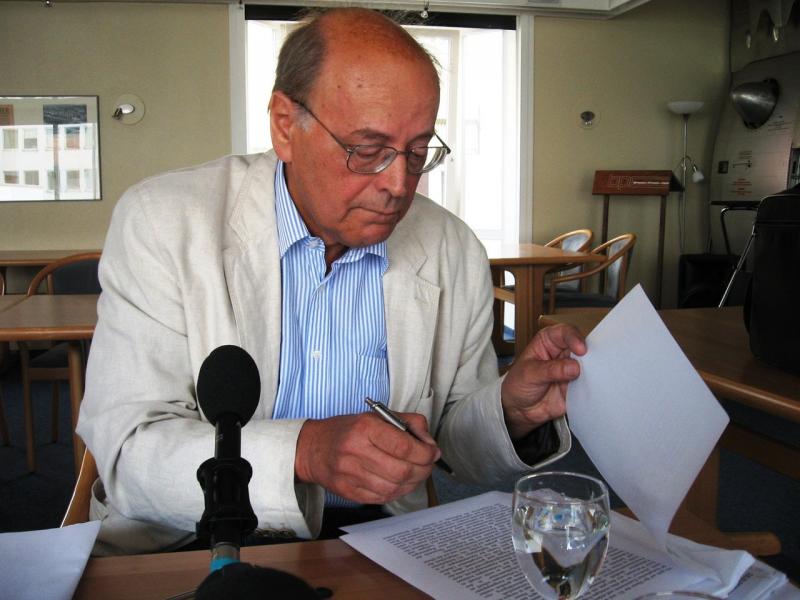
Professor Wohlmuth beim Interview im Presseclub zu Bremen
Die Sendung zum Nachhören (vgl. Audiodatei)
Karl Wohlmuth: Plädoyer für die "Vereinigten Staaten von Europa"
Freitag, 15. Juni 2012, 15.05-16.00 Uhr
Nordwestradio unterwegs, Freitag, 15. Juni 2012, 15.05-16.00 Uhr
Call for Papers: Globalization and Developing Economies
IWIM invites submissions for its Research Programme "Globalization and Developing Economies". The Research Programme highlights a) impacts of globalization on economic theory and on development economics, and b) impacts on economic reform processes in developing economies. The various Publication Series of IWIM will be used for quick dissemination of research results. There is preference for policy-oriented papers, for focussed case studies, for country cases, and for surveys of the current research.
Papers and book manuscripts are invited for the following areas of globalization research:
Explaining Globalization: The Wisdom of Economic Theory and of Development Economics
Globalization, the Nation State and the New International Economic Order
Globalization and Economic Reform Processes in Emerging Economies
Globalization and Economic Reform Processes in Transition Economies
Globalization and Economic Reform Processes in Africa
Globalization and Economic Reform Processes in China
Submissions will be reviewed by Professor Karl Wohlmuth (wohlmuth@uni-bremen.de) and a feedback will be communicated within four weeks.
The submissions may be published in the following IWIM Publication Series:
IWIM White Discussion Paper Series
IWIM Blue Discussion Paper Series
IWIM China in the World Economic Discussion Paper Series
Submissions to: Professor Karl Wohlmuth, University of Bremen, Email: wohlmuth@uni-bremen.de
Wie viel Globalisierung verträgt die Welt?: Dieser Beitrag im ifo Schnelldienst 24/2002 wird auch noch 10 Jahre später international sehr stark nachgefragt. Aus diesem Grunde wird noch einmal auf die wesentlichen Thesen der vier Autoren verwiesen (Links: Texte der vier Autoren: www.cesifo-group.de/DocDL/SD24-2002.pdf und http://www.cesifo-group.de/portal/pls/portal/docs/1/1200789.PDF)
Kurztext: Wie viel Globalisierung verträgt die Welt? (Link: http://www.cesifo-group.de/portal/page/portal/ifoHome/_DocBase_root/DocBase_intro/_Publication_Abstract?p_item_id=14570267&p_back=liste)
Wie viel Globalisierung verträgt die Welt?
Hans-Werner Sinn, Michael Rauscher, Rainer Bartel, Karl Wohlmuth
Der Begriff der Globalisierung beherrscht seit Jahren die öffentliche Debatte. Für die einen geht die Öffnung der Märkte noch nicht weit genug, für die anderen führt die Globalisierung zur weiteren ungleichen Entwicklung der Nationalökonomien und vergrößert den Abstand zwischen den Industrie- und Entwicklungsländern. Prof. Dr. Dr. h.c. Hans-Werner Sinn zeigt in seinem Beitrag die ökonomischen Kräfte auf, die durch den Prozess der Globalisierung freigesetzt werden. Nach Meinung von Prof. Dr. Michael Rauscher, Universität Rostock, wird die Globalisierung ohne Frage weiter voranschreiten. Es bedarf aber nicht nur einer internationalen Koordination. Im Gegenteil: »Auch in einer sich globalisierenden Welt gibt es gute Argumente für das Subsidiaritätsprinzip: Probleme sollten auf der niedrigstmöglichen Ebene geregelt und gelöst werden. Viele der Probleme, die im Zusammenhang mit der Globalisierung auftreten, können auf nationaler Ebene angegangen werden.« Auch für Prof. Dr. Karl Wohlmuth, Universität Bremen, ist die Gestaltung der Globalisierung die entscheidende Frage. Wichtig ist für ihn vor allen Dingen, »inwieweit eine Bereitschaft zur Anpassung der nationalen und internationalen Rahmenbedingungen an das Tempo der Globalisierung besteht«. Für Prof. Dr. Rainer Bartel, Universität Linz, muss die Globalisierung vor allem »effizient« und »nachhaltig« sein, »aber Wissenschaft und Politik dürften dazu noch nicht bereit sein«
Short Summary in English (Link: http://www.cesifo-group.de/portal/page/portal/ifoHome/_DocBase_root/DocBase_intro/_Publication_Content?p_article_nr=110120020240)
How much globalisation can the world bear?
By Hans-Werner Sinn, Michael Rauscher, Rainer Bartel, Karl Wohlmuth
The term globalisation has dominated the public debate for years. For some the opening of markets has not gone far enough, for others globalisation has led to further inequalities between economies and has enlarged the distance between industrial and developing countries. Prof. Hans-Werner Sinn discusses the economic forces that have been released in the globalisation process. In the opinion of Prof. Michael Rauscher, Rostock University, globalisation will undoubtedly continue to progress, but it does not only need international co-ordination. On the contrary, in a globalised world there are good arguments for the subsidiarity principle: Problems should be dealt with and solved at the lowest possible level. Many problems that arise in connection with globalisation can be managed at the national level. Also for Prof. Karl Wohlmuth, Bremen University, the structure of globalisation is the determining issue. What is important for him is "the extent to which there is a willingness to adapt national and international framework conditions to the speed of globalisation". For Prof. Rainer Bartel, Linz University, globalisation must be "efficient" and "sustainable" but "scientists and politicians are still not ready for this".
Economic Conferences of IWIM/Tagungen des IWIM
Ein wichtiger Bestandteil der Arbeit des Instituts ist die Durchführung der "Jahreswirtschaftstagung", der Veranstaltungsreihe "Weltwirtschaftliches Colloquium" sowie von weiteren wissenschaftlichen Veranstaltungen. Dabei werden aktuelle Fragestellungen der Weltwirtschaft und des internationalen Managements diskutiert.
Die in zweijährigem Rhythmus stattfindende Jahreswirtschaftstagung bietet den Teilnehmern aus dem In- und Ausland ein Forum für den Informations- und Erfahrungsaustausch. In Vorträgen und Workshops werden u. a. auch die Forschungsergebnisse der dem Institut angeschlossenen Wissenschaftler mit dem Fachpublikum diskutiert.
Annual Economic Conferences/Jahreswirtschaftstagungen:
· November 2005: IX. Jahreswirtschaftstagung: "Wirtschafts- und Beschäftigungspolitik in der Globalisierung Spielräume regionaler, nationaler und internationaler Akteure" (Tagungsort: World Trade Center, Bremen, Link zur Buchreihe).
· November 2003: VIII. Jahreswirtschaftstagung: "See- und Luftverkehrsmärkte im Umbruch - Weltwirtschaftliche Strukturveränderungen auf strategischen Märkten" (Tagungsort: World Trade Center Bremen, Link zur Buchreihe).
· November 2001: VII Jahreswirtschaftstagung: "Bilanz und Perspektiven der Transformation in Mittel- und Osteuropa" (Tagungsort: Bremer Forum; hier das Buch zu dieser Tagung, und der Link zur Buchreihe).
· November 1999: VI. Jahreswirtschaftstagung: "Innovation als Schlüsselfaktor eines erfolgreichen Wirtschaftsstandortes Nationale und Regionale Innovationssysteme im globalen Wettbewerb" (Tagungsort: World Trade Center Bremen; hier das Buch zu dieser Tagung).
· November 1997: V. Jahreswirtschaftstagung: "Bremen im nationalen und internationalen Standortwettbewerb Bestandsaufnahme und Perspektiven" (Tagungsort: World Trade Center Bremen; hier das Buch zu dieser Tagung).
· November 1995: IV. Jahreswirtschaftstagung "Geschäftspartner China" (hier das Buch zu dieser Tagung).
· IWIM-Jahreswirtschaftstagung 1993: III. Jahreswirtschaftstagung "Neue Perspektiven für internationale Unternehmenskooperationen" (Veröffentlichung: Sell, A. (Hrsg.): Neue Perspektiven für internationale Unternehmenskooperationen, Institut für Weltwirtschaft und Internationales Management, Bd. 3, Tagungsband zur III. Jahreswirtschaftstagung des IWIM 1993, Lit-Verlag, Münster und Hamburg 1995) (Link zur Schriftenreihe des IWIM).
· IWIM September 1992: II. Jahreswirtschaftstagung "Kleine Energieprojekte in Entwicklungsländern" (Veröffentlichung: Köllmann, C./Oesterdiekhoff, P./Wohlmuth, K. (Hrsg.): Kleine Energieprojekte in Entwicklungsländern, Institut für Weltwirtschaft und Internationales Management, Bd. 1, Lit-Verlag, Münster und Hamburg 1993) (Link zur Schriftenreihe des IWIM).
· IWIM-Jahreswirtschaftstagung 1991: I. Jahreswirtschaftstagung "Die Transformation der osteuropäischen Länder in die Marktwirtschaft" (Veröffentlichung: Fischer, Jürgen/Frank Messner/Karl Wohlmuth (Hrsg.): Die Transformation der osteuropäischen Länder in die Marktwirtschaft, Schriftenreihe Osteuropa, Geschichte, Wirtschaft, Politik, Band 3, Münster/Hamburg: Lit Verlag 1992) (Link:http://books.google.de/books/about/Die_Transformation_der_osteurop%C3%A4ischen.html?id=LbQIv6VJ70cC&redir_esc=y).
Bremen und die Globalisierung der Weltwirtschaft/Bremen and the Globalisation of the World Economy:
Die IWIM-Professoren Alfons Lemper, Axel Sell und Karl Wohlmuth haben im Kompetenzzentrum Internationale Wirtschaftsbeziehungen und Internationales Management der Universität Bremen Forschungen zu den Auswirkungen der Globalisierung der Weltwirtschaft auf die Wirtschaft und die Wirtschaftspolitik in Bremen durchgeführt. Die Forschungen wurden in Zusammenarbeit mit der Handelskammer Bremen und dem Senat der Freien Hansestadt Bremen durchgeführt. So kam bereits recht früh (bereits 1986) eine Zusammenarbeit der Universität Bremen mit der Handelskammer Bremen zustande. Auch mit diversen bremischen Regionalforschungseinrichtungen wurde kooperiert. Besonderes Gewicht lag bei den Forschungen auf den Konsequenzen der Globalisierung für die Technologiepolitik und die Standortpolitik in Bremen. Später wurden auch insbesondere im Rahmen der Jahreswirtschaftskonferenzen des IWIM - die Auswirkungen der Globalisierung auf die Beschäftigungspolitik, die Außenwirtschaftspolitik, die überregionale Verkehrspolitik und die allgemeine Wirtschaftspolitik des Landes Bremen untersucht.
In den Materialien des Wissenschaftsschwerpunktes "Globalisierung der Weltwirtschaft" (die frühere Bezeichnung der Reihe war: "Materialien des Universitätsschwerpunkts Internationale Wirtschaftsbeziehungen und Internationales Management") wurden zahlreiche Studien in diesem Kontext veröffentlicht (vgl. insbesondere die Nummern 1, 2, 5, 7, 10, 11, 14, 15, 16 - Link: Weiße Reihe http://www.iwim.uni-bremen.de/publikationen/pub-white.htm). Auch in der Zeitschrift "Berichte" des Partnerinstituts (Forschungsinstitut der Internationalen Wissenschaftlichen Vereinigung für Weltwirtschaft und Weltpolitik/IWVWW e. V) in Berlin wurden zahlreiche Beiträge zu diesem Thema veröffentlicht (Link zur Homepage der IWVWW: http://www.iwvww.de/).

Quelle: Bremen als Standort für Hochtechnologie, Herausgegeben von Alfons Lemper, Axel Sell, Rasul Shams, Karl Wohlmuth, Bremen: Wissenschaftliche Einheit Weltwirtschaft, Universität Bremen 1986, 394 Seiten,
ISBN-88722-123-0

Quelle: Bremen im nationalen und internationalen Standortwettbewerb, Bestandsaufnahmen und Perspektiven, herausgegeben von Maren Wiegand und Karl Wohlmuth, Band 5 der Schriftenreihe des Instituts für Weltwirtschaft und Internationales Management, Hamburg: LIT, 1998, 277 Seiten,
ISBN- 3-8258-3770-x
The IWIM professors Alfons Lemper, Axel Sell und Karl Wohlmuth have done researches in the Competence Center International Economic Relations and International Management on the impacts of globalization on the country state of Bremen. The purpose was to look at the implications for economic policy in Bremen. The researches were pursued in cooperation with the Chamber of Commerce in Bremen and the responsible offices of the Government of Bremen. Early in the history of the University of Bremen (already in 1986) a cooperation between the Chamber of Commerce in Bremen and the University of Bremen was agreed for the purpose of publishing a Handbook on High Technology Production in Bremen. The cooperation was extended to other researches on economic development in Bremen and to a number of research institutes and policy forums located in Bremen in order to involve other experts, researchers and policymakers into this initiative.
Researches were concentrated in the first phase on the impact of globalization on technology policy and on economic location policies in Bremen. Later the IWIM professors have researched also on other aspects of globalization and its repercussions on the economy of Bremen especially employment policy, foreign trade and investment policy, international transport and traffic policies, and general economic policies.
In the Discussion Paper Series of IWIM "Globalization of the World Economy" (Link: IWIM White Series Discussion Papers) a great number of discussion papers was published on the issues of globalization and its effects on Bremen (see the numbers 1, 2, 5, 7, 10, 11, 14, 15, 16 - Link White Series Discussion Papers: http://www.iwim.uni-bremen.de/publikationen/pub-white.htm). Also in the journal of our partner institute in Berlin "Berichte" various articles were published in this context (Link Homepage of IWVWW in Berlin: http://www.iwvww.de/).
The two books "Bremen als Standort für Hochtechnologie"/"Bremen as a Location of High Technology Production" and "Bremen im nationalen und internationalen Standortwettbewerb"/"Bremen in the National and International Location Competition" (see bibliographic details above) received great recognition among policymakers and researchers not only in Bremen. The books were also presented to experts of the Federal Economic Ministries in Bonn.
University of Bremen Global Economy Seminars and Courses at the Inter-University Centre Dubrovnik (IUC)
During the 1970s, 1980s and at the beginning of the 1990s the University of Bremen was very active in launching Global Economy Seminars and Courses at the Inter-University Centre (IUC) in Dubrovnik . Being a member of the Inter-University Centre (IUC) just from the opening of the institution in 1972, the University of Bremen was represented in the IUC Council by Professor Karl Wohlmuth for almost two decades (see the photo of his attendance at the First Council Meeting in Dubrovnik, taken from: Fragments of Memories, cited below, p. 17). In his function Professor Karl Wohlmuth launched various course and seminar programmes and initiated the participation of professors and researchers from the University of Bremen at academic events of the IUC.
Major seminars and courses launched by Professor Karl Wohlmuth for the university of Bremen were in the fields of Transnational Corporations and World Order (January-February 1976), Structural Adjustment and East-West-South Economic Cooperation (February/March 1985); and Least Developed and Oil-rich Arab Countries (May 1990). For all these seminars and courses held in Dubrovnik the major contributions and the recordings of the discussions were published in international conference reports. The main messages of the academic work in Dubrovnik were widely disseminated:
Course Transnational Corporations and World Economic Order: January/February 1976; organized by Professor Karl Wohlmuth; a report published as: Wolfgang Däubler/Karl Wohlmuth, Herausgeber, Transnationale Konzerne und Weltwirtschaftsordnung, Baden-Baden : Nomos Verlagsgesellschaft 1978. This First International Seminar by the University of Bremen at IUC was a course to bring together representatives of economics and law faculties working on Transnational Corporations and World Economic Order issues.
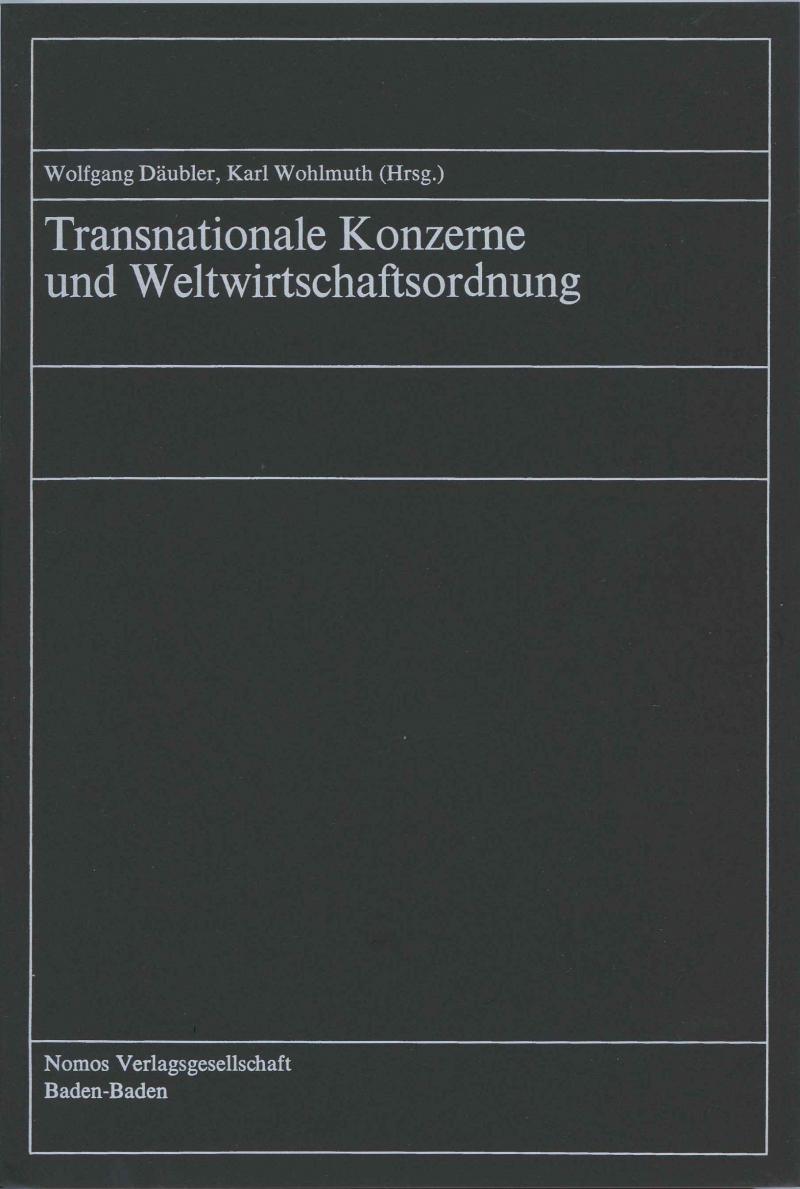
Course Structural Adjustment and East-West-South Economic Cooperation: February/March 1985; organized by Professor Karl Wohlmuth; a report was published as: Wohlmuth, Karl, Editor, 1989, Structural Adjustment in the World Economy and East-West-South Economic Cooperation, Bremen : Institute For World Economics and International Management (IWIM), University of Bremen , Germany . This Second International Seminar of the University of Bremen at IUC was a course to bring together researchers from the East, the South sand the West to work on economic cooperation perspectives towards peace, solidarity, and a new and sustainable international economic order. There was international reporting on the meeting (see below):

Wohlmuth, Karl, 1986a, Structural Adjustment in the World Economy and East-West-South Economic Cooperation: A Review, Report on the Second International Seminar by the University of Bremen at the Inter-University Centre Dubrovnik , pp. 68 77, in: Development And Peace, Volume 7, No. 2, Autumn 1986
Wohlmuth, Karl, 1986b, with the assistance of Dirk Hansohm and Peter Oesterdiekhoff, Structural Adjustment in the World Economy and East-West-South Economic Cooperation, Report on the Second International Seminar by the University of Bremen at the Inter-University Centre Dubrovnik, pp. 337 347, in: Verfassung Und Recht In Übersee/Law And Politics In Africa Asia And Latin America, 19. Jahrgang/Volume 19, 3. Quartal/Third Quarter 1986
Course Least Developed and Oil-rich Arab Countries: May 1990; organized by Professor Karl Wohlmuth and M. A. Mohamed Salih, Senior Research Fellow, Scandinavian Institute of African Studies, Sweden; a report was published as: Kunibert Raffer/M. A. Mohamed Salih, Eds., 1992, The Least Developed and the Oil- Rich Arab Countries, Dependency, Interdependence or Patronage?, Houndmills, Basingstoke, Hampshire and London: The Macmillan Press Ltd., St. Martin's Press 1992. This Third International Seminar of the University of Bremen at IUC was a course to bring together economists from Arab Least Developed Countries, Oil Exporting Arab Countries and development economists from the West. Major interrelationships between the Poor and the Rich Arab Countries like in trade, finance and migration were investigated; there were also discussions on the role of the Developed Countries towards the Least Developed and the Rich Arab Countries.

The IUC was reopened after civil wars in former Yugoslavia . The Centre about itself (see the homepage of the IUC http://www.iuc.hr/ and some information about the IUC below):
The Mission of the IUC:
"Inter-University Centre Dubrovnik is an independent international institution for advanced studies structured as a consortium of universities with a mission to organise and promote contact and exchange through projects, study programmes, courses and conferences across a wide range of scientific concerns. Programme directors and resource persons coming from about 170 member universities worldwide cooperate in organising the activities. IUC is open to new member institutions as well as to new programmes."
About the Location:
"Ever since the establishment of the IUC, Dubrovnik has served as an ideal site for this institution. This community has a long history as an independent city-state, always promoting a rich and fertile environment for scientific and artistic developments at the cross-roads of a wide range of trade and contact routes so well located between East and West, North and South. Dubrovnik is considered a perfect setting for contemporary efforts to exchange knowledge and ideas. After the academic part of the IUC programmes, participants may explore Dubrovnik 's rich history, visit museums, churches, walk the City walls, visit other scientific institutions, attend concerts, or just enjoy the natural Mediterranean ambience."
The Founder of the IUC:
Professor Ivan Supek, Academician and Rector of the University of Zagreb , President of the Croatian Academy of Sciences, is the real founder of the IUC. He presented his ideas in 1970 to the interested parties in Yugoslavia and in Dubrovnik ; he found enthusiastic response from all sides and then he established the IUC in Dubrovnik ; he made the IUC operational since 1970 towards the first courses that were given in 1972 and the First Council Meeting that was held in June 1972.
History of the IUC:
See for download the book about the IUC: http://www.iuc.hr/IucAdmin/Server/downloads/fragments_of_memories_mali.pdf
Frana Bulica 4, Dubrovnik F O R P U B L I S H E R: Dr. Krunoslav PiskISBN 9789539976529
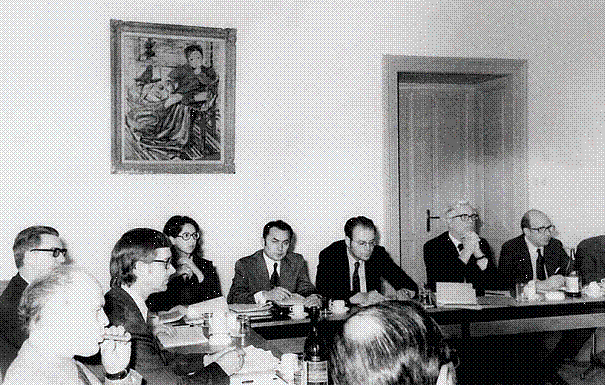
Berta Dragi~evi}, Ante Pa`anin, Karl Wohlmuth
Directed by Professor Karl Wohlmuth, University of Bremen/Geleitet von Professor Karl Wohlmuth, Universität Bremen
Selected Contributions/Ausgewählte Beiträge
Programme Component One/Programmkomponente Eins:
The Control of Transnational Corporations and the Development Strategy of Self-Reliance/Die Kontrolle transnationaler Konzerne und Self-Reliance als Entwicklungsstrategie (see the list of selected contributions/vgl. die Liste der ausgewählten Studien: PDF hier)
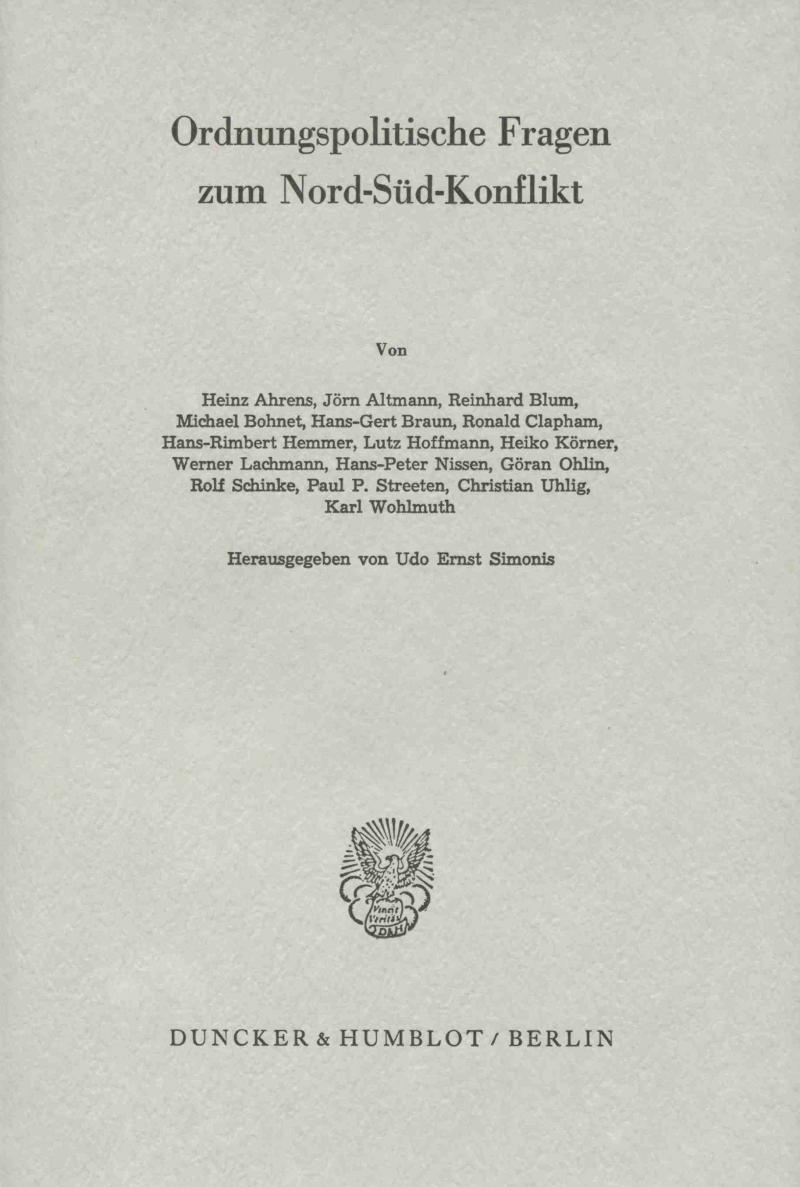
Wohlmuth, Karl, 1983, Die Kontrolle transnationaler Konzerne in Entwicklungsländern als ordnungspolitisches Problem, S. 293-317, in: Udo Ernst Simonis, Hrsg., Ordnungspolitische Fragen zum Nord-Süd-Konflikt, Schriften des Vereins für Socialpolitik, Gesellschaft für Wirtschafts- und Sozialwissenschaften, Neue Folge, Band 129, Berlin: Duncker & Humblot

Wohlmuth, Karl, 1980, Collective Self-Reliance und die Kontrolle transnationaler Konzerne, S. 323 -365, in: Khushi M. Khan, Hrsg., Self-Reliance als nationale und kollektive Entwicklungsstrategie, Weltwirtschaft und Internationale Beziehungen, Diskussionsbeiträge, Nr. 20, München/London: Weltforum Verlag

Wohlmuth, Karl, 1979, Transnational Corporations and the New International Economic Order, S. 66-79, in: Economics, A Biannual Collection of Recent German Contributions to the Field of Economic Science, Volume 20, A Series Issued in the Service of Scientific Co-operation, Tübingen: Institute For Scientfic Co-operation

Wohlmuth, Karl, 1978, Neue Weltwirtschaftsordnung und Transnationale Konzerne. Perspektiven für eine integrierte Kontrollstrategie, S. 123-163, in: Karl Wohlmuth und Wolfgang Däubler, Hrsg., Transnationale Konzerne und Weltwirtschaftsordnung, Baden-Baden: Nomos Verlagsgesellschaft, 1. Auflage, 1978
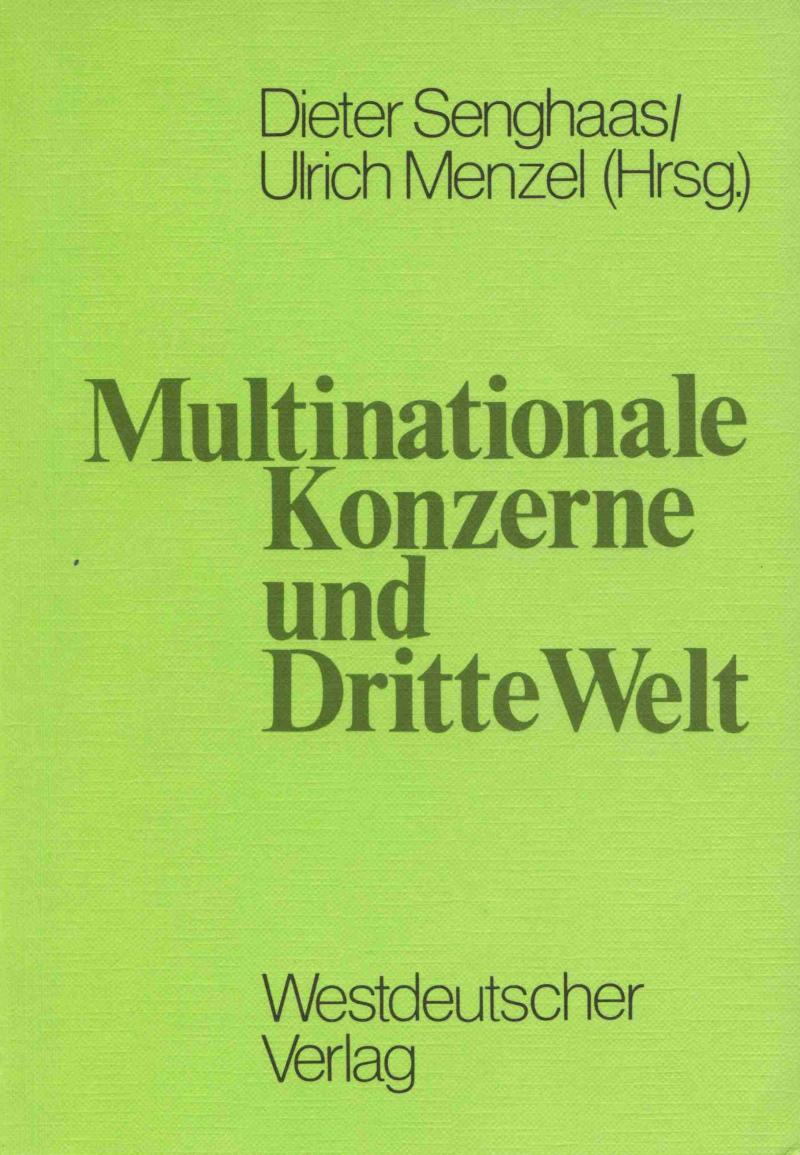
Wohlmuth, Karl, 1976, Multinationale Konzerne, nationaler Markt und Unterentwicklung, S. 67-101, in: Dieter Senghaas und Ulrich Menzel, Hrsg, Multinationale Konzerne und Dritte Welt, Opladen: Westdeutscher Verlag
Programme Component Two/Programmkomponente Zwei:
Empirical Studies on Transnational Corporations/Empirische Studien über Transnationale Konzerne (see the list of selected contributions/vgl. die Liste der ausgewählten Studien: PDF)
Sugar Industry in Sudan/Zuckerindustrie im Sudan: Empirical Researches in Khartoum and Kenana, Sudan/Empirische Forschungen in Khartum und Kenana, Sudan


Third World Multinationals/Multinationale Konzerne der Dritten Welt: Empirical Studies in the Sao Paulo Region, Brazil/Empirische Studien in der Region Sao Paulo, Brasilien

Wohlmuth, Karl, 1986, Practices and policies of host countries towards Third World multinationals: a competitive edge against old multinationals?, pp. 211- 239, in: Khushi M. Khan, Ed., Multinationals of the South: New Actors in the International Economy, London: Frances Pinter Publishers/Hamburg: German Overseas Institute
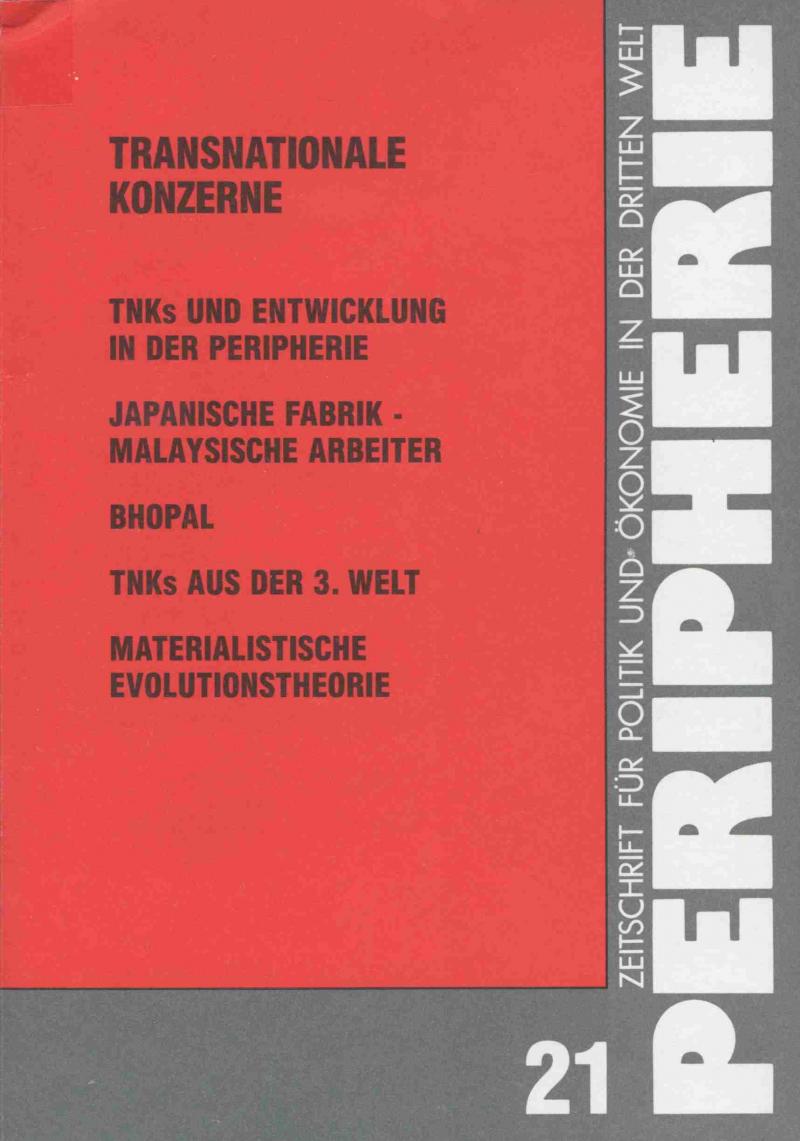
Wohlmuth, Karl/Dirk Hansohm, 1985, Transnationale Konzerne der Dritten Welt und der Entwicklungsprozess armer Länder, S. 60 78, in: Peripherie, Zeitschrift Für Politik Und Ökonomie In der Dritten Welt, Nr. 21, 6. Jahrgang, Sommer 1985, erschienen Oktober 1985, Thema: Transnationale Konzerne
Transnational Corporations in Paraguay/Transnationale Konzerne in Paraguay: Asuncion, Paraguay Lectures by Professor Karl Wohlmuth
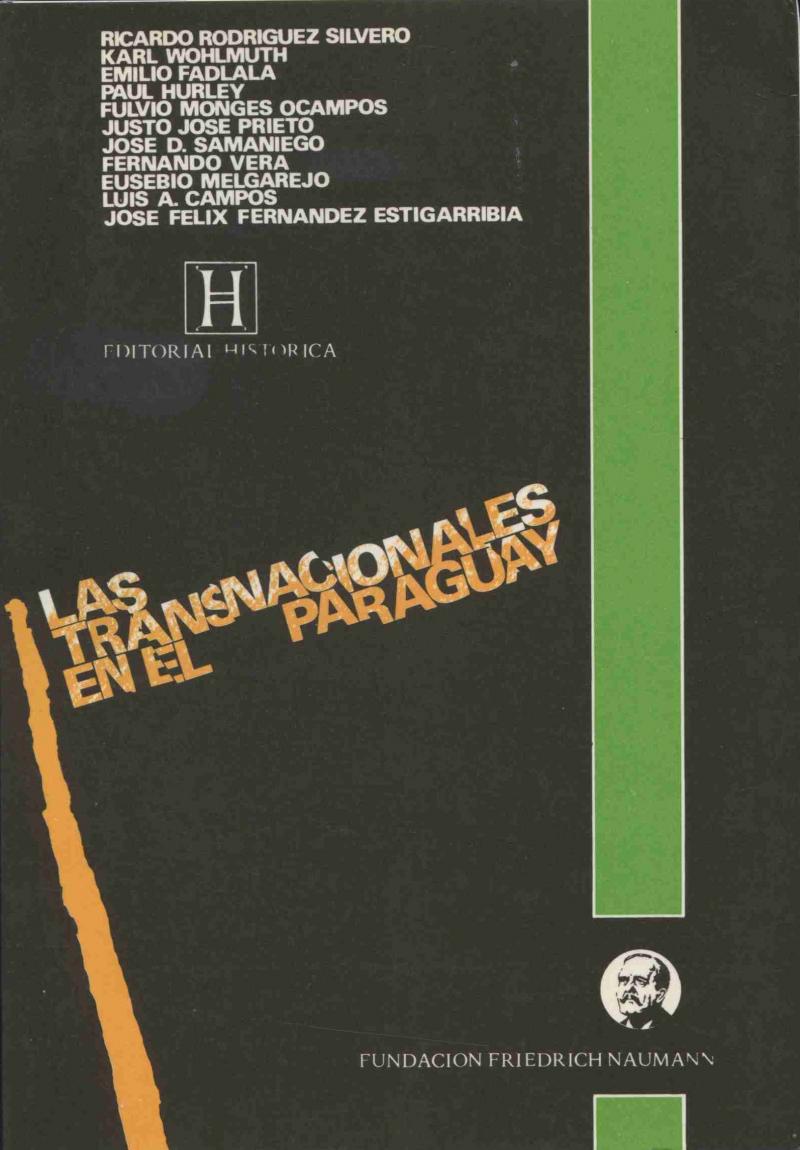
Wohlmuth, Karl, 1985, Empresas Transnacionales Y Paises En Desarrollo. Deformacion Estructural En Los Paises En Desarrollo. Efectos Estructurales De Las Empresas Transnacionales En Los Paises En Desarrollo, pp. 77-112, in: Ricardo Rodriguez Silvero, Karl Wohlmuth, et al., Las Transnacionales En El Paraguay, Asuncion Paraguay, Editorial Historica, Funcacion Friedrich Naumann, International Seminar, 2 -7, 1985, Universidad Catolica de Asuncion, Paraguay
Wohlmuth Karl, 1985, Posibilidades De Control De Las Empresas Transnacionales En Los Paises En Desarrollo, pp. 113-141, in: Ricardo Rodriguez Silvero, Karl Wohlmuth, et al., Las Transnacionales En El Paraguay, Asuncion Paraguay, Editorial Historica, Funcacion Friedrich Naumann, International Seminar, 2 -7, 1985, Universidad Catolica de Asuncion, Paraguay
Collective Self-Reliance and the Control of Transnational Corporations in Sri Lanka/Collective Self-Reliance und Transnationale Konzerne in Sri Lanka: based on a University of Peradeniya, Peradeniya, Sri Lanka Lecture/Conference Contribution/basierend auf einem Konferenzbeitrag und einer Vorlesung an der Universität Peradeniya, Peradeniya, Sri Lanka
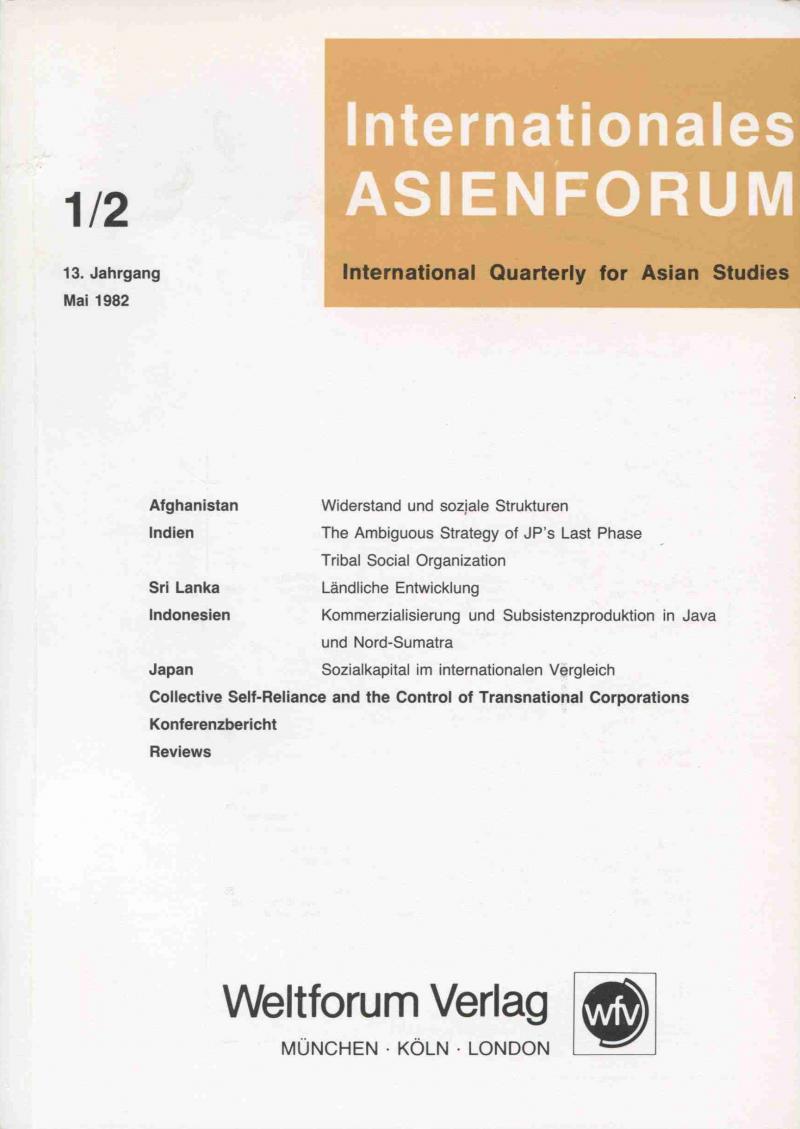
Wohlmuth, Karl, 1982, Collective Self-Reliance and the Control of Transnational Corporations in Developing Countries, With Comments on Sri Lanka's Open-Door Policy, pp. 137-165, in: Internationales Asienforum, Vol. 13, 1982, No. 1/2
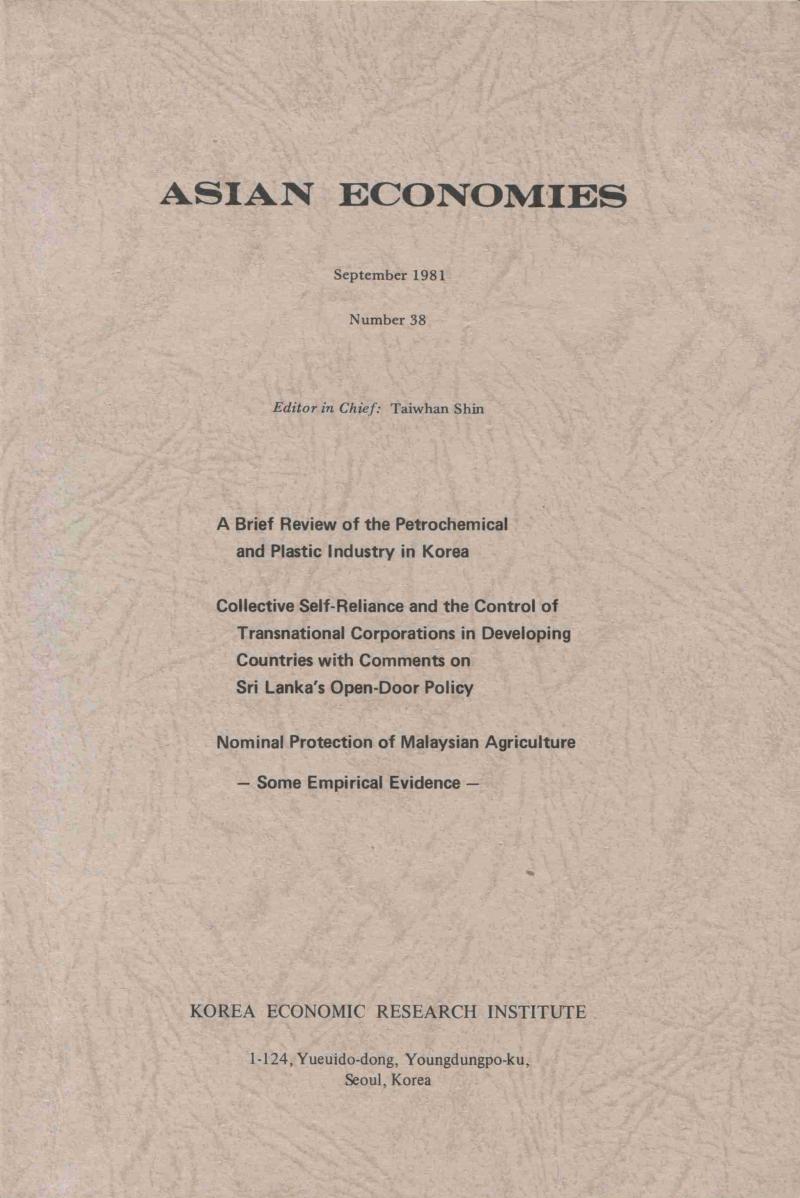
Wohlmuth, Karl, 1981, Collective Self-Reliance And the Control Of Transnational Corporations In Developing Countries With Comments on Sri Lanka's Open-Door Policy, pp. 33-63, in: Asian Economies, September 1981, Number 38, Korea Economic Research Institute, Seoul, Korea
Transnational Corporations and Economic Policy in the Federal Republic of Germany/Transnationale Konzerne und Wirtschaftspolitik in der Bundesrepublik Deutschland: Conceptual and Empirical Assessments/Konzeptionelle und empirische Bewertungen
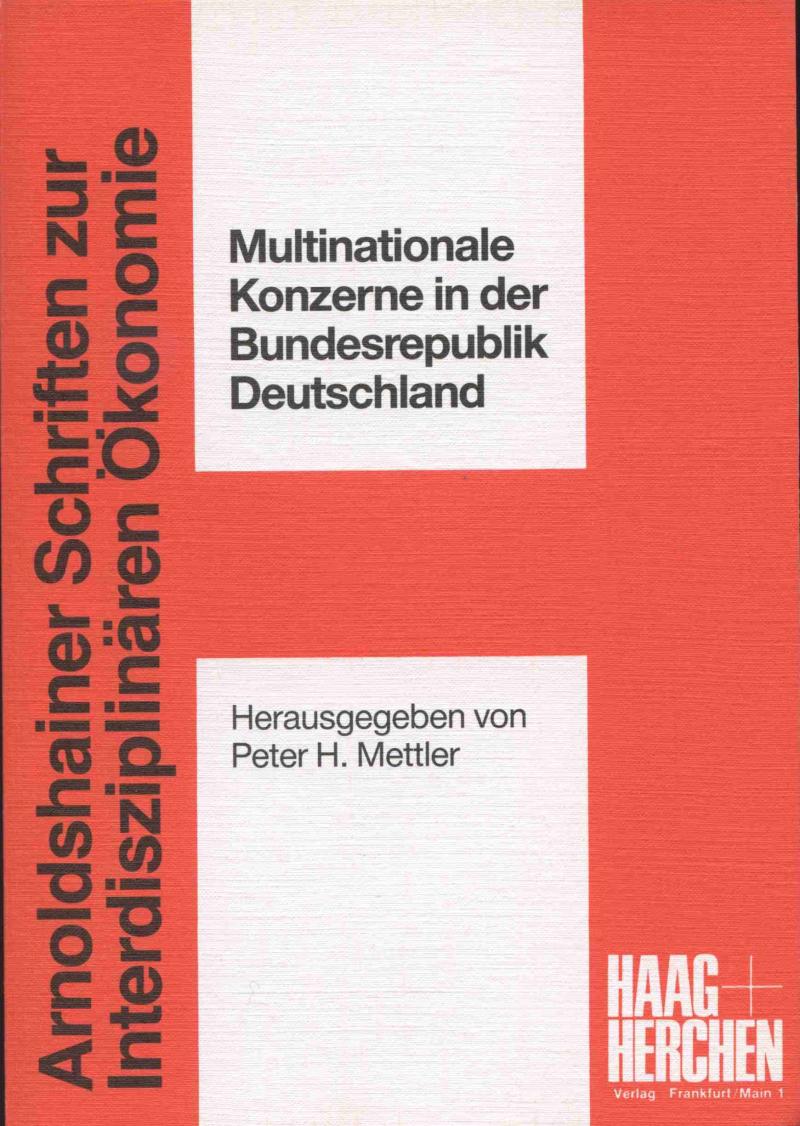

Wohlmuth, Karl, 1980, Die Bundesrepublik und die Diskussion über die Kontrolle der Aktivitäten transnationaler Konzerne in Entwicklungsländern, S. 73-96, in: diskurs, Bremer Beiträge zu Wissenschaft und Gesellschaft, Thema: Bundesrepublik und Neue Weltwirtschaftsordnung, 1. Auflage, August 1980, Heft 3, Universität Bremen, Bremen
Research Programme "Transnational Corporations and World Economic Order"/Forschungsprogramm "Transnationale Konzerne und Weltwirtschaftsordnung" (Full List of Selected Publications for the two Programme Components)
Additional Information on the Research Programme:
PhD studies, Discussion papers, Working Papers, Conference
Contributions (Link)
Links to related Programmes of the University of Bremen and
Partners:
ZenTra, Center for Transnational Studies:
Link: http://www.zen-tra.de/start
Profile Group on Transnational Corporations: Prof. Dr. Sarianna M.
Lundan, Chair in International Management and Governance (IMG):


